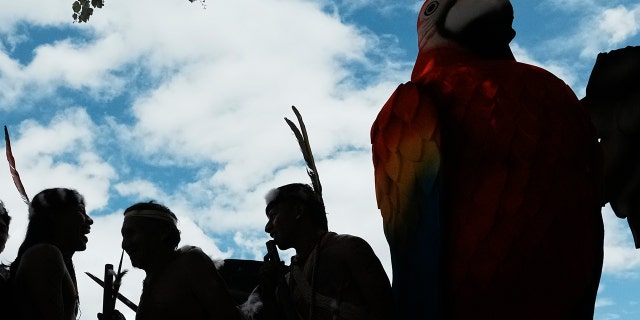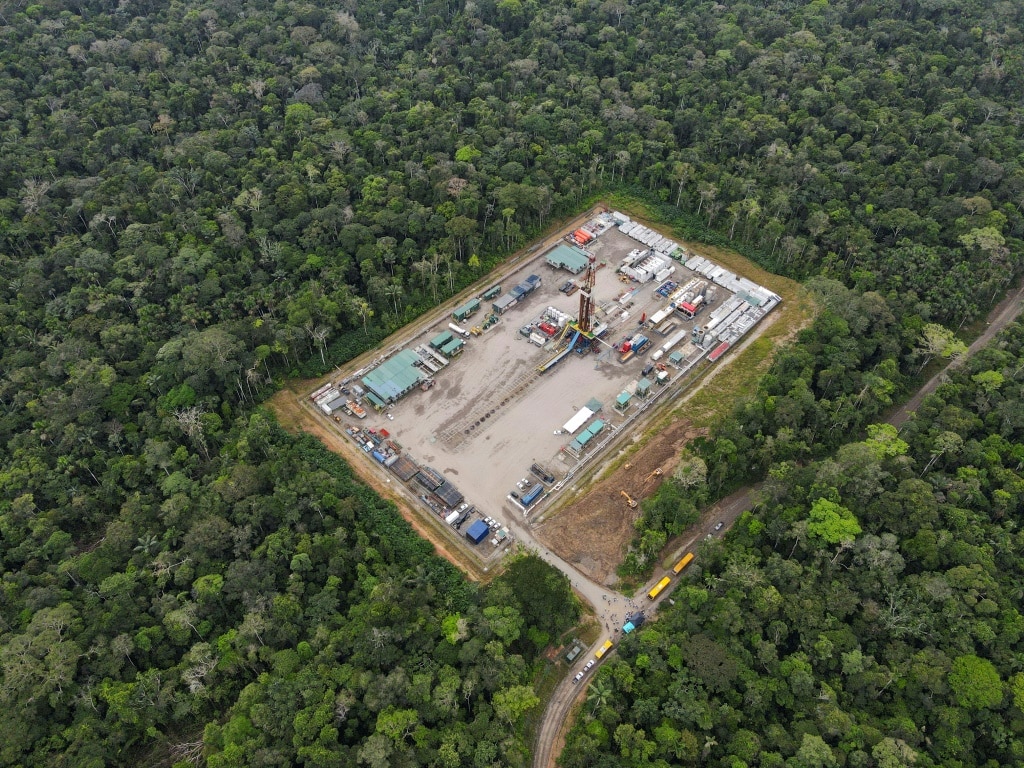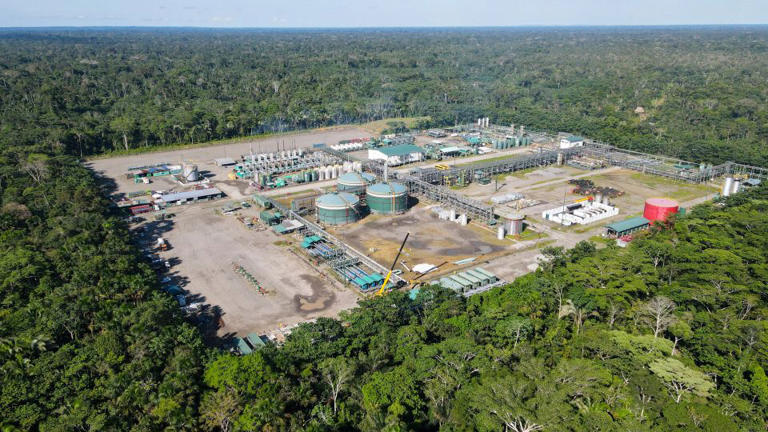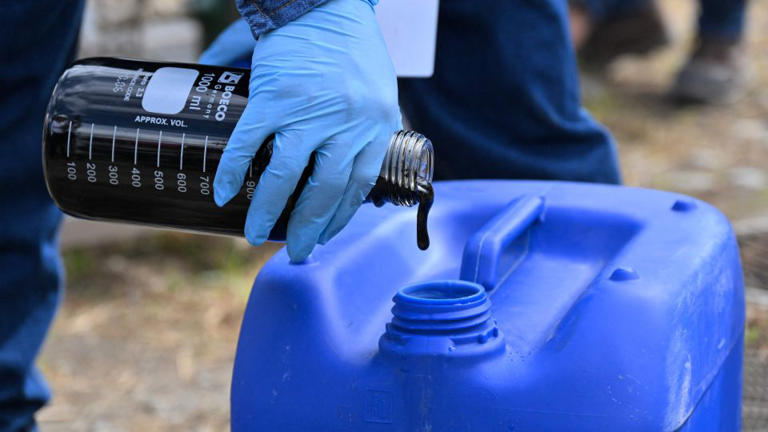GOOD NEWS! ¡qué buena noticia!
Ecuador votes against drilling oil in protected area of Amazon rainforest
Yasuni National Park is home to 610 species of birds, 139 species of amphibians, and 121 species of reptiles

Waorani Indigenous people attend an event promoting a "yes" vote in a referendum on not extracting oil in Quito, Ecuador, on Aug. 14, 2023. (AP Photo/Dolores Ochoa))
The outcome represents a significant blow to Ecuadorian President Guillermo Lasso, who advocated for oil drilling, asserting that its revenues are crucial to the country’s economy. State oil company Petroecuador will be required to dismantle its operations in the coming months.
The referendum took place alongside the presidential election, which will be decided in a runoff between leftist candidate Luisa González and right-wing contender Daniel Noboa. The country is experiencing political turmoil following the assassination of one of the candidates, Fernando Villavicencio.
Ecuador votes in historic referendum on oil extraction in the AmazonYasuni National Park is home to 610 species of birds, 139 species of amphibians, and 121 species of reptiles
Associated Press
Published August 21, 2023
Ecuadorians voted against drilling for oil in a protected area of the Amazon, an important decision that will require the state oil company to end its operations in a region that’s home to two uncontacted tribes and is a hotspot of biodiversity.
Yasuni National Park is inhabited by the Tagaeri and Taromenani, who live in self-isolation. In 1989, it was designated a world biosphere reserve by the United Nations Educational, Scientific and Cultural Organization, also known as UNESCO. Encompassing a surface area of over 2.5 million acres, it boasts 610 species of birds, 139 species of amphibians, and 121 species of reptiles. At least three species are endemic.
With over 90% of the ballots counted by early Monday, around six in 10 Ecuadorians rejected the oil exploration in Block 43, situated within Yasuni.

Published August 21, 2023
Ecuadorians voted against drilling for oil in a protected area of the Amazon, an important decision that will require the state oil company to end its operations in a region that’s home to two uncontacted tribes and is a hotspot of biodiversity.
Yasuni National Park is inhabited by the Tagaeri and Taromenani, who live in self-isolation. In 1989, it was designated a world biosphere reserve by the United Nations Educational, Scientific and Cultural Organization, also known as UNESCO. Encompassing a surface area of over 2.5 million acres, it boasts 610 species of birds, 139 species of amphibians, and 121 species of reptiles. At least three species are endemic.
With over 90% of the ballots counted by early Monday, around six in 10 Ecuadorians rejected the oil exploration in Block 43, situated within Yasuni.


Waorani Indigenous people attend an event promoting a "yes" vote in a referendum on not extracting oil in Quito, Ecuador, on Aug. 14, 2023. (AP Photo/Dolores Ochoa))
The outcome represents a significant blow to Ecuadorian President Guillermo Lasso, who advocated for oil drilling, asserting that its revenues are crucial to the country’s economy. State oil company Petroecuador will be required to dismantle its operations in the coming months.
The referendum took place alongside the presidential election, which will be decided in a runoff between leftist candidate Luisa González and right-wing contender Daniel Noboa. The country is experiencing political turmoil following the assassination of one of the candidates, Fernando Villavicencio.
Ecuador votes to stop oil drilling in Amazon reserve
August 22, 2023

August 22, 2023

A Petroecuador oil platform is seen in Yasuni National Park in June 2023
Ecuadorans have voted to stop an oil drilling project in an Amazon reserve, according to the results Monday of a referendum hailed as a historic example of climate democracy.
The "Yes" vote to halt exploitation of an oil block in the Yasuni National Park, one of the most diverse biospheres in the world, won by 59 percent, with 98 percent of votes tallied.
"Today Ecuador takes a giant step to protect life, biodiversity, and indigenous people," the country's two main indigenous organizations, Confeniae and Conaie, posted on social media.
After years of demands for a referendum, the country's highest court authorized the vote in May to decide the fate of "block 43," which contributes 12 percent of the 466,000 barrels of oil per day produced by Ecuador.
The block is situated in a reserve which stretches over one million hectares and is home to three of the world's last uncontacted Indigenous populations and a bounty of plant and animal species.
Drilling began in 2016 after years of fraught debate and failed efforts by then president Rafael Correa to persuade the international community to pay cash-strapped Ecuador $3.6 billion not to drill there.
The government of outgoing President Guillermo Lasso has estimated a loss of $16 billion over the next 20 years if drilling is halted.
The reserve is home to the Waorani and Kichwa tribes, as well as the Tagaeri, Taromenane and Dugakaeri, who choose to live isolated from the modern world.
National oil company Petroecuador had permission to exploit 300 hectares, but says it is only using 80 hectares.
The Amazon basin -- which stretches across eight nations -- is a vital carbon sink.
Scientists warn its destruction is pushing the world's biggest rainforest close to a tipping point, beyond which trees would die off and release carbon rather than absorb it, with catastrophic consequences for the climate.
The fate of the reserve has drawn the attention of celebrities such as Hollywood star and environmental activist Leonardo DiCaprio.
"With this first-of-its-kind referendum worldwide, Ecuador could become an example in democratizing climate politics, offering voters the chance to vote not just for the forest but also for Indigenous rights, our climate, and the well-being of our planet," he wrote on Instagram this month.
Swedish climate campaigner Greta Thunberg also hailed the "historic referendum."
The NGO Amazon Frontlines said the vote was a "demonstration of climate democracy, where people, not corporations, get to decide on resource extraction and its limits."
Locals in Yasuni were divided, with some supporting the oil companies and the benefits that economic growth have brought to their villages.
sp/fb/bgs
The "Yes" vote to halt exploitation of an oil block in the Yasuni National Park, one of the most diverse biospheres in the world, won by 59 percent, with 98 percent of votes tallied.
"Today Ecuador takes a giant step to protect life, biodiversity, and indigenous people," the country's two main indigenous organizations, Confeniae and Conaie, posted on social media.
After years of demands for a referendum, the country's highest court authorized the vote in May to decide the fate of "block 43," which contributes 12 percent of the 466,000 barrels of oil per day produced by Ecuador.
The block is situated in a reserve which stretches over one million hectares and is home to three of the world's last uncontacted Indigenous populations and a bounty of plant and animal species.
Drilling began in 2016 after years of fraught debate and failed efforts by then president Rafael Correa to persuade the international community to pay cash-strapped Ecuador $3.6 billion not to drill there.
The government of outgoing President Guillermo Lasso has estimated a loss of $16 billion over the next 20 years if drilling is halted.
The reserve is home to the Waorani and Kichwa tribes, as well as the Tagaeri, Taromenane and Dugakaeri, who choose to live isolated from the modern world.
National oil company Petroecuador had permission to exploit 300 hectares, but says it is only using 80 hectares.
The Amazon basin -- which stretches across eight nations -- is a vital carbon sink.
Scientists warn its destruction is pushing the world's biggest rainforest close to a tipping point, beyond which trees would die off and release carbon rather than absorb it, with catastrophic consequences for the climate.
The fate of the reserve has drawn the attention of celebrities such as Hollywood star and environmental activist Leonardo DiCaprio.
"With this first-of-its-kind referendum worldwide, Ecuador could become an example in democratizing climate politics, offering voters the chance to vote not just for the forest but also for Indigenous rights, our climate, and the well-being of our planet," he wrote on Instagram this month.
Swedish climate campaigner Greta Thunberg also hailed the "historic referendum."
The NGO Amazon Frontlines said the vote was a "demonstration of climate democracy, where people, not corporations, get to decide on resource extraction and its limits."
Locals in Yasuni were divided, with some supporting the oil companies and the benefits that economic growth have brought to their villages.
sp/fb/bgs
Story by By Hannah Holland •
The people of Ecuador are heading to the polls – but they’re voting for more than just a new president. For the first time in history, the people will decide the fate of oil extraction in the Ecuadorian Amazon.
The referendum will give voters the chance to decide whether oil companies can continue to drill in one of the most biodiverse places on the planet, the Yasuní National Park, home to the last uncontacted indigenous communities in Ecuador.

Among the species found in the Yasuní National Park, is the harpy eagle, the second largest bird of prey in the world.
- Carl De Souza/AFP/Getty Images© Provided by CNN
The park encompasses around one million hectares at the meeting point of the Amazon, the Andes and the Equator. Just one hectare of Yasuní land supposedly contains more animal species than the whole of Europe and more tree species than exist in all of North America.
But underneath the land lies Ecuador’s largest reserve of crude oil.
“We are leading the world in tackling climate change by bypassing politicians and democratizing environmental decisions,” said Pedro Bermo, the spokesman for Yasunidos, an environmental collective who pushed for the referendum.
It’s been a decade-long battle that began when former President Rafael Correa boldly proposed that the international community give Ecuador $3.6 billion to leave Yasuní undisturbed. But the world wasn’t as generous as Correa expected. In 2016, the Ecuadorian state oil company began drilling in Block 43 – around 0.01% of the National Park – which today produces more than 55,000 barrels a day, amounting to around 12% of Ecuador’s oil production.

Aerial picture of the Tiputini Processing Center of state-owned Petroecuador in Yasuni National Park, June 21, 2023.
The park encompasses around one million hectares at the meeting point of the Amazon, the Andes and the Equator. Just one hectare of Yasuní land supposedly contains more animal species than the whole of Europe and more tree species than exist in all of North America.
But underneath the land lies Ecuador’s largest reserve of crude oil.
“We are leading the world in tackling climate change by bypassing politicians and democratizing environmental decisions,” said Pedro Bermo, the spokesman for Yasunidos, an environmental collective who pushed for the referendum.
It’s been a decade-long battle that began when former President Rafael Correa boldly proposed that the international community give Ecuador $3.6 billion to leave Yasuní undisturbed. But the world wasn’t as generous as Correa expected. In 2016, the Ecuadorian state oil company began drilling in Block 43 – around 0.01% of the National Park – which today produces more than 55,000 barrels a day, amounting to around 12% of Ecuador’s oil production.

Aerial picture of the Tiputini Processing Center of state-owned Petroecuador in Yasuni National Park, June 21, 2023.
- Rodrigo Buendia/AFP/Getty Images© Provided by CNN
A continuous crusade of relentless campaigning and a successful petition eventually made its mark – in May, the country’s constitutional court authorized the vote to be included on the ballot of the upcoming election.
It’s a decision that will likely be instrumental to the future of Ecuador’s economy. Supporters who want to continue drilling believe the loss of employment opportunities would be disastrous.
“The backers of the request for crude to remain underground made it ten years ago when there wasn’t anything. 10 years later we find ourselves with 55,000 barrels per day, that’s 20 million barrels per year,” Energy Minister Fernando Santos told local radio.
“At $60 a barrel that’s $1.2 billion,” he added. “It could cause huge damage to the country,” he said, referring to economic damage and denying there has been environmental harm.
Alberto Acosta-Burneo, an economist and editor of the Weekly Analysis bulletin, said Ecuador would be “shooting itself in the foot” if it shut down drilling. In a video posted on X, formerly known as Twitter, he said that without cutting consumption all it would mean is another country selling Ecuador fuel.
But ‘yes’ campaigners have ideas to fill the gap, from the promotion of eco-tourism and the electrification of public transport to eliminating tax exemptions. They claim that cutting the subsidies to the richest 10% of the country would generate four times more than what is obtained extracting oil from Yasuní.
“This election has two faces,” explained Bermo.
“On one hand we have the violence, the candidates, parties, and the same political mafias that governed Ecuador without significant changes.
“On the other hand, the referendum is the contrary – a citizen campaign full of hope, joy, art, activism and a lot of collective work to save this place. We are very optimistic.”
Among those campaigning to stop the drilling is Helena Gualinga, an indigenous rights advocate who hails from a remote village in the Ecuadorian Amazon – home of the Kichwa Sarayaku community.

A crude oil sample taken from an oil well in Yasuní National Park, where the referendum vote could mean leaving the crude oil in the ground indefinitely.
A continuous crusade of relentless campaigning and a successful petition eventually made its mark – in May, the country’s constitutional court authorized the vote to be included on the ballot of the upcoming election.
It’s a decision that will likely be instrumental to the future of Ecuador’s economy. Supporters who want to continue drilling believe the loss of employment opportunities would be disastrous.
“The backers of the request for crude to remain underground made it ten years ago when there wasn’t anything. 10 years later we find ourselves with 55,000 barrels per day, that’s 20 million barrels per year,” Energy Minister Fernando Santos told local radio.
“At $60 a barrel that’s $1.2 billion,” he added. “It could cause huge damage to the country,” he said, referring to economic damage and denying there has been environmental harm.
Alberto Acosta-Burneo, an economist and editor of the Weekly Analysis bulletin, said Ecuador would be “shooting itself in the foot” if it shut down drilling. In a video posted on X, formerly known as Twitter, he said that without cutting consumption all it would mean is another country selling Ecuador fuel.
But ‘yes’ campaigners have ideas to fill the gap, from the promotion of eco-tourism and the electrification of public transport to eliminating tax exemptions. They claim that cutting the subsidies to the richest 10% of the country would generate four times more than what is obtained extracting oil from Yasuní.
“This election has two faces,” explained Bermo.
“On one hand we have the violence, the candidates, parties, and the same political mafias that governed Ecuador without significant changes.
“On the other hand, the referendum is the contrary – a citizen campaign full of hope, joy, art, activism and a lot of collective work to save this place. We are very optimistic.”
Among those campaigning to stop the drilling is Helena Gualinga, an indigenous rights advocate who hails from a remote village in the Ecuadorian Amazon – home of the Kichwa Sarayaku community.

A crude oil sample taken from an oil well in Yasuní National Park, where the referendum vote could mean leaving the crude oil in the ground indefinitely.
- Rodrigo Buendia/AFP/Getty Images© Provided by CNN
“This referendum presents a huge opportunity for us to create change in a tangible way,” she told CNN.
For Gualinga, the most crucial part of the referendum is that if Yasunidos wins, the state oil company will have a one-year deadline to wrap up its operations in Block 43.
She explained that some oil companies have left areas in the Amazon without properly shutting down operations and restoring the area.
“This sentence would mean they have to do that.”
Those who wish to continue drilling in the area argue that meeting the one-year deadline to dismantle operations would be impossible.
The referendum comes as the world faces blistering temperatures, with scientists declaring July as the hottest month on record, and the Amazon approaching what studies are suggesting is a critical tipping point that could have severe implications in the fight to tackle climate change.
And according to Antonia Juhasz, a Senior Researcher on Fossil Fuels at Human RIghts Watch, it’s time for Ecuador to transition to a post-oil era. Ecuador’s GDP from oil has dropped significantly from around 18% in 2008, to just over 6% in 2021.
She believes the benefits of protecting the Amazon outweigh the benefits of maintaining dependence on oil, particularly considering the cost of regular oil spills and the consequences of worsening the climate crisis.
“The Amazon is worth more intact than in pieces, as are its people,” she said.
“This referendum presents a huge opportunity for us to create change in a tangible way,” she told CNN.
For Gualinga, the most crucial part of the referendum is that if Yasunidos wins, the state oil company will have a one-year deadline to wrap up its operations in Block 43.
She explained that some oil companies have left areas in the Amazon without properly shutting down operations and restoring the area.
“This sentence would mean they have to do that.”
Those who wish to continue drilling in the area argue that meeting the one-year deadline to dismantle operations would be impossible.
The referendum comes as the world faces blistering temperatures, with scientists declaring July as the hottest month on record, and the Amazon approaching what studies are suggesting is a critical tipping point that could have severe implications in the fight to tackle climate change.
And according to Antonia Juhasz, a Senior Researcher on Fossil Fuels at Human RIghts Watch, it’s time for Ecuador to transition to a post-oil era. Ecuador’s GDP from oil has dropped significantly from around 18% in 2008, to just over 6% in 2021.
She believes the benefits of protecting the Amazon outweigh the benefits of maintaining dependence on oil, particularly considering the cost of regular oil spills and the consequences of worsening the climate crisis.
“The Amazon is worth more intact than in pieces, as are its people,” she said.
CNN
No comments:
Post a Comment